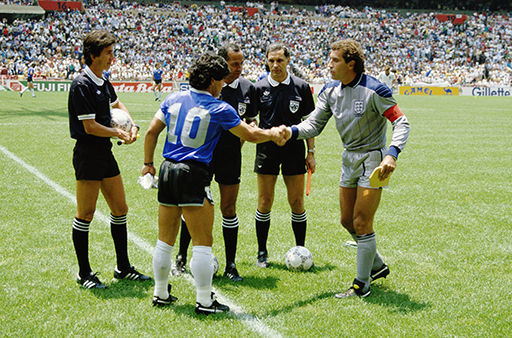3 England vs Argentina: the good, the bad and the ugly
England vs Argentina (1986 men’s quarter-final)
The background:
This match is remembered for ‘the good’ (a sublime goal from Maradona), ‘the bad’ (an obvious handball by the same player) and ‘the ugly’ (context of a recent war). If you think back to the categorisation of rivalries in the previous section, the following could be relevant here:
- Former wartime conflict – the Falklands conflict in 1982 between Argentina and Britain added fuel to a long-standing rivalry and was symbolically re-enacted within this tie.
- Ideological rivalry – less so in the typical sense of ideologies centred around nation’s ways of living as Argentina were no longer ruled by the military dictatorship introduced within Session 2, but more from the perspective of footballing ideologies. As the Argentinian style of creole football evolved (one that was restless, individualistic and skilful) the English suggested that Argentina struggled to play football with moral values (Rock, 2008), emphasised by their own style of being disciplined, methodical and physically powerful.
- Colonial (an observation) – England did not colonise Argentina, but English merchants and seamen did bring the game to the country. So, there is a historic backdrop and cultural resonance of Argentina enjoying playing and establishing superiority over the English (linked to playing styles).
The match:
Argentina secured a 2-1 victory over England with two contrasting, yet equally famous, goals from Maradona. His goals are claimed to have characterised Argentina – gifted, but susceptible to trickery and deception if needed; the perfect embodiment of fútbol criollo [creole] (Sibaja and Parrish, 2014). The first, the notorious ‘hand of God’ saw the diminutive striker outjump goalkeeper Peter Shilton, fisting the ball into the back of the net. Replays showed an obvious handball but the referee saw no infraction and the goal stood. Minutes later, Maradona picked up the ball in his own half and dribbled past every white shirt that approached him, before calmly slotting the ball beyond a helpless Shilton. A late consolation goal for England did little to suppress Argentina’s celebrations.
Activity 2 Political meaning from an Argentinian perspective
Much of what you might have previously read about this fixture probably comes from the English perspective. However, let’s explore how politics were involved in this match from an Argentinean standpoint. Watch the video below and answer the following question:
- Using the six political aspects of sport from Session 1 (power relations, nationalism and identity, inclusion or segregation, activism, conflict and commercialisation), identify the meaning of this match to Argentinians.
Argentina v England: the socio-political rivalry [Tip: hold Ctrl and click a link to open it in a new tab. (Hide tip)]
Discussion
You might have considered the following aspects to be prevalent:
- Nationalism – this undoubtedly reinforced Argentinian nationalism in the shadow of defeat in conflict. Maradona later wrote in his autobiography: ‘More than defeating a football team, it was defeating a country’ (Maradona, 2004, p. 127).
- Identity – the symbolism of beating the English to strengthen the Argentinian footballing identity is clear.
- Conflict – victory came at a time when Argentina was still hurting from its defeat in the Falklands where they lost 649 military personnel, while there were also 255 deaths among the British forces (Grice and Brown, 2022).
You will notice crossover here. That is because rarely do the political themes permeate in isolation. Instead, they tend to touch on a range of interlinking thoughts and perceptions.
The aftermath:
Argentina went on to win their second World Cup title, beating West Germany in the final. The match itself has been widely considered the most controversial game in World Cup history and Maradona’s second goal was since voted Goal of the Century in a FIFA poll (FIFA, 2018).

